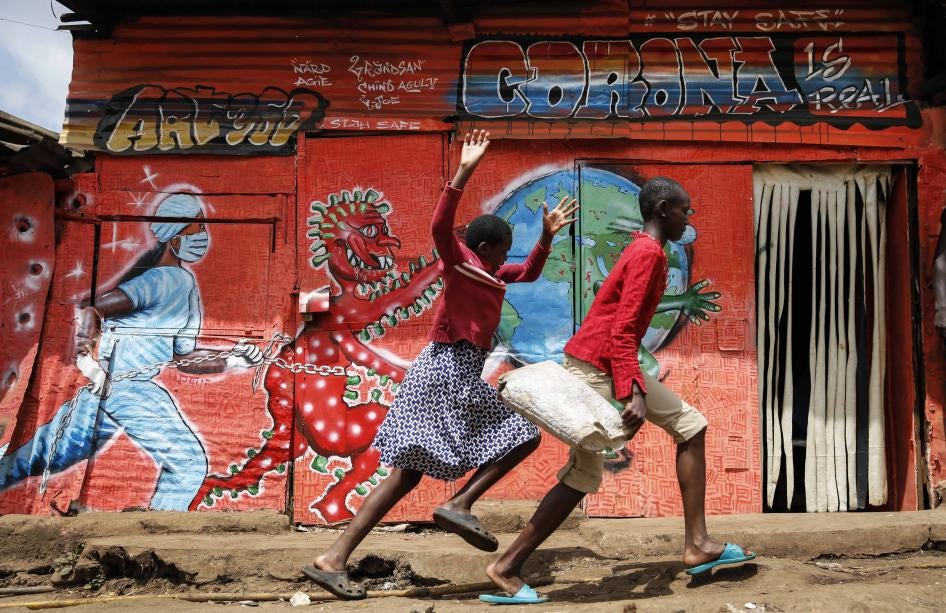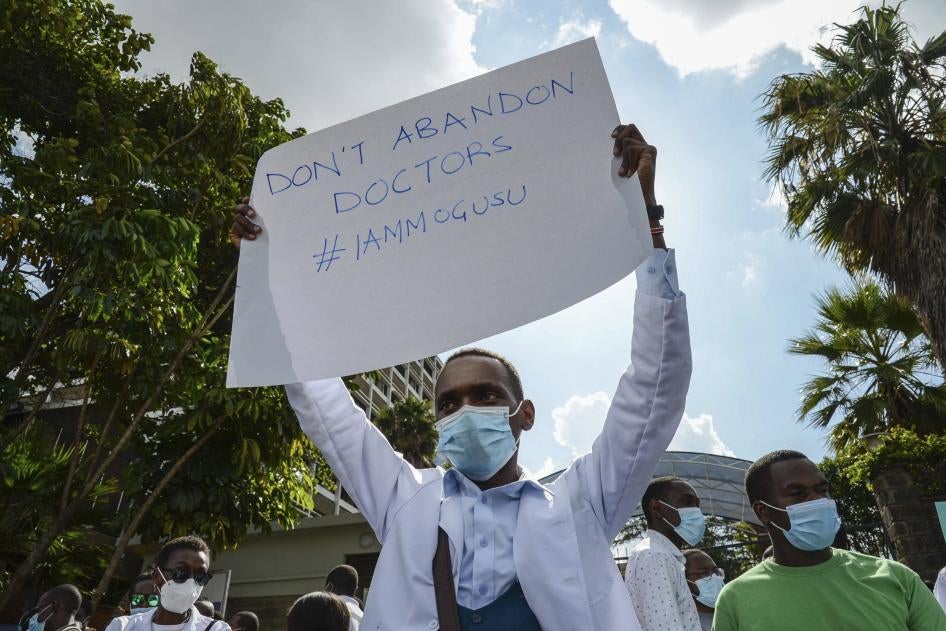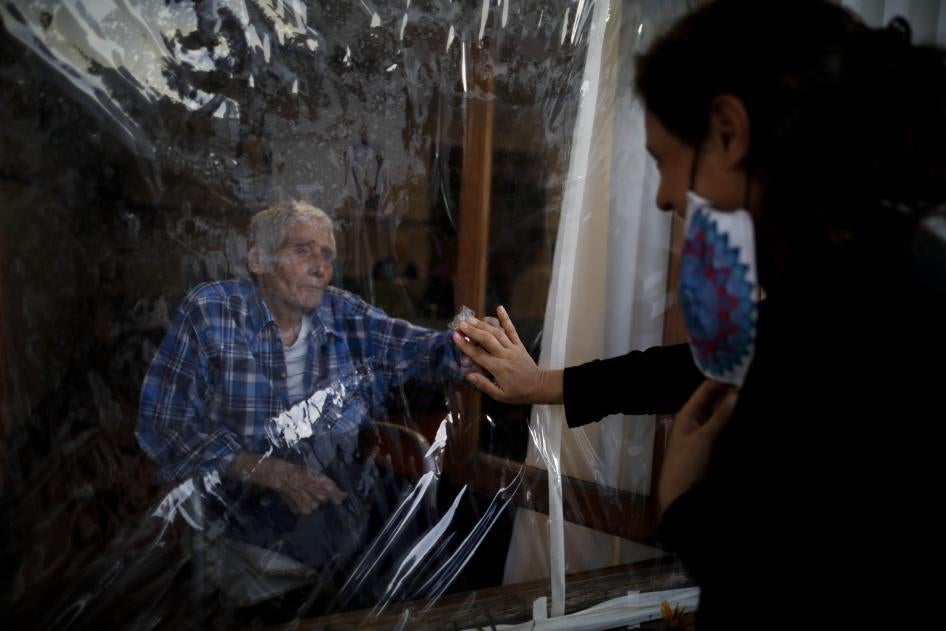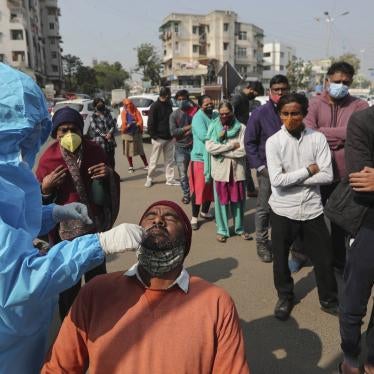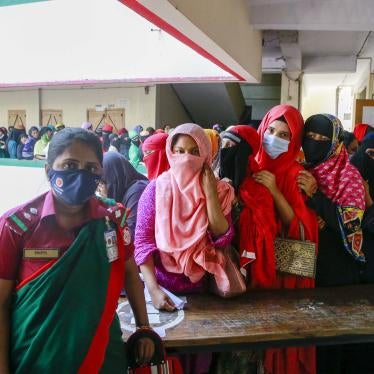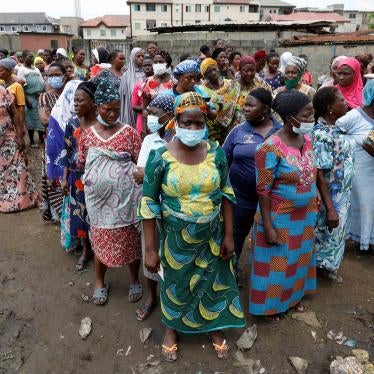The Covid-19 pandemic has now taken at least six million lives prematurely. Experts estimate a true death toll may be double or even quadruple that number, with death rates particularly high among older people. Millions more will grapple with the effects of “long Covid,” or disability brought on by their bout with the disease. Close to two billion schoolchildren and college students have had their education interrupted, some for months on end. Pandemic-related school closures didn’t just interrupt, but also abruptly ended education for millions of children, especially girls, ethnic minorities, and those experiencing poverty. Countless children were pushed into early marriage, parenthood, or child labor by circumstances linked to the pandemic. A half-billion people were forced into poverty or saw their poverty deepen, while billions of others are living through the consequences of a pandemic-induced economic slowdown.
As we enter the third year of the pandemic, the inequities that have characterized the past two years are only being further entrenched. Fifteen months after the World Health Organization gave emergency authorization to the first Covid-19 vaccine, huge disparities in vaccine access remain globally. While some people are receiving third and even fourth doses of vaccines, more than 85 percent of people living in low-income countries are still waiting for their first dose.
The Covid-19 pandemic is not over. As the third year begins, New Zealand, South Korea, Hong Kong, and Vietnam are each experiencing their highest reported wave of infections since the pandemic was declared in March 2020. The world over, many are justifiably wondering: What should have been done differently?
Human Rights Watch research over two years of the pandemic spotlights both governments’ failures to meet human rights obligations, as well as cynical attempts to use the pandemic as a ploy to expand powers, squeeze critics, and suppress dissent. Our research points to how things could have been different if human rights had been central in more policy responses. It also points to a more equitable way forward.
Here are seven ways governments could recalibrate their approach to the pandemic in year three:
- Protect Freedom of Expression and Access to Timely and Accurate Information
Access to timely and accurate, science-based information about the virus and governments’ responses is critical to stopping the spread of diseases like Covid-19. Yet, in many countries, even in the second year of the pandemic, politicians and policymakers repressed efforts to provide and share information, even engaging in the spread of misinformation. In India, during the summer of 2021’s brutal Delta wave, tens of thousands of people died during a surge in Covid-19 cases after the government failed to prepare adequately. Instead of a quick and transparent response, the government suppressed dissent and provided opaque information about the spread of the virus. Abandoned corpses along riverbanks in rural parts of northern India pointed to a death toll far above the official estimate. The surge in cases was exacerbated by healthcare shortages throughout the country, including testing capacity, medicines, ambulance services, hospital beds, and oxygen support.
US government officials admitted to not seeing either Delta or Omicron “coming” – but public health experts had been warning of this eventuality for months. The WHO’s chief scientists warn that further variants of concern may emerge, but in many countries where vaccine access is widespread such as the United States, United Kingdom, and much of Europe, authorities lifted or began to roll back mitigation measures in early 2022, despite increasing the risk for older people and those who are immunocompromised.
A history of misinformation, coupled with the government’s failure to reach marginalized populations, left many in Hong Kong – especially older people and those living in aged care homes – hesitant to get vaccinated. Now hospitals are struggling as Hong Kong faces the highest Covid-19 death rate per capita in the world as of early March 2022.
The presidents of Brazil and Mexico continued in 2021 to downplay the severity of the virus, promoted fringe treatments, and stoked a dangerous attitude of denialism. In Brazil, a congressional inquiry concluded President Jair Bolsonaro’s disastrous Covid-19 response endangered the health and lives of Brazilians.
- Protect Healthcare Workers from Infection and Burnout
In Kenya, a haphazard, uncoordinated response affected the welfare of thousands of health workers, who went on strike from December 2020 to February 2021 to protest inadequate remuneration, poor working conditions, and shortages of personal protective equipment. In the Philippines, failures to pay frontline health workers properly and on time spurred some to quit. Neither dynamic was unique to Kenya or the Philippines. Globally, some millions of healthcare workers, particularly nurses, burned out from grueling work and quit the work force.
In Yemen, health workers struggled to get vaccinations that were intended for them as Houthi authorities obstructed distribution of Covid-19 vaccines in July 2021, and engaged in disinformation. In Australia, those working in aged care homes faced shortages of rapid antigen tests in early 2022.
- Safely Restore Quality Education for All Children and Urgently Tackle Education Loss
Schools entered the pandemic ill-prepared to deliver remote education to all students equally. This was due to governments’ long-term failure to remedy discrimination and inequalities in their education systems, or to ensure basic government services such as affordable, reliable electricity in homes, or facilitate affordable internet access.
In many countries, education systems struggled to overcome these longstanding issues leading to widespread education loss, particularly among the youngest children and those most marginalized. In Brazil, the government decreased federal resources for education, and in one instance, the executive branch attempted to block a bill that aimed to provide emergency funds to increase access to the internet for students and teachers.
Children’s success at learning remotely or independently during Covid-19 related school closures in 2021 was heavily dependent on the quality of their home accommodation. For example, in the United Kingdom, the poor quality and uninhabitable temporary accommodation being offered to families in need by local councils made it harder for children to find a quiet environment to concentrate.
- Lifesaving Health Products Should Be Available, Affordable, and Accessible
Inequitable access to affordable Covid-19 vaccines persists, jeopardizing health, lives, and livelihoods. Pharmaceutical companies and the governments that funded them have failed to reach agreement on sharing knowledge and technology to expand and diversify global production of Covid-19 vaccines. As a result, while almost 11 billion Covid-19 vaccine doses have been administered globally as we approach year three, in low- and middle-income countries millions of doctors, frontline workers, and people at high risk of severe illness and death are still waiting for their first dose. Despite some commitments allowing for the more diversified production of antiviral pills, as safe and effective treatments came on the market, some of the same dynamics we have seen in vaccine access have been replicated. This disparity, where people in low- and middle-income countries are at the back of the queue, isn’t the inevitable result of market shortages, but a direct result of governments failing to fulfill their human rights obligations to share the benefits of scientific research to protect the rights to life, health, and a decent standard of living.
Long before the WHO granted emergency use listing to any Covid-19 vaccine, a handful of rich countries pre-booked most of the world’s vaccine supply, meaning much of the world would struggle to get doses needed to vaccinate even their highest-risk populations. Costa Rica successfully convinced the WHO to launch a novel “technology access pool” for Covid-19 health products, creating a platform for developers of these products to share their intellectual property, knowledge, and data with manufacturers. In November 2021, a Spanish lab contributed antibody technology to the pool, and in March 2022, the United States National Institute of Health pledged to make contributions too. Separately, India and South Africa approached the World Trade Organization in October 2020 seeking a temporary waiver of some intellectual property rights until “widespread vaccination is in place globally, and the majority of the world’s population has developed immunity.” Almost 18 months later, their proposal remains in limbo, although the European Commission which had opposed and blocked the effort has promised to work with the African Commission to “deliver a solution” on the issue by spring this year.
- Emergency Responses Should be Proportionate and Nondiscriminatory
In the second year of the pandemic, governments continued to implement Covid-19 emergency measures that were, in some cases, a pretext to grab power and crack down on journalists, activists, medics questioning the authorities’ responses to the coronavirus, and political opposition groups. While governments have a responsibility to protect the public from harm including the spread of Covid-19, measures that were disproportionate or used as a tool of repression both flouted this obligation and exacerbated mistrust, misinformation, and public health failures.
In Sri Lanka, the police abused many and killed at least two people in May and June 2021 while enforcing Covid-19 lockdown regulations. For almost two years, until early March 2022, the Sri Lankan government used the pandemic to restrict the freedom of religion of Muslims, first requiring cremation for all people who died with Covid-19, then allowing such burials only at a single remote location. These restrictions ran counter to both Islamic faith tradition and the WHO’s guidance, without any scientific justification. In the Maldives, authorities used Covid-19 regulations in April and May 2021 to prevent protests over government inaction in prosecuting cases of sexual violence. Similarly, even into the second year of the pandemic in Poland, some protesters continued to face charges for violating Covid-19 safety measures when they took to the streets to protest a near-total abortion ban.
Since March 2020, the Thai government has enforced a nationwide state of emergency using the Covid-19 pandemic as a pretext, providing the authorities’ broad powers to restrict fundamental freedoms. Thousands of people who took part in democracy protests have been charged with violating social distancing measures, curfew restrictions, and other emergency measures. In Uganda, security forces arrested lesbian, gay, bisexual, and transgender (LGBT) people at shelters and beat, extorted, shot, and arrested opposition politicians and supporters, and journalists for allegedly failing to comply with the government’s Covid-19 restrictions.
Throughout the second year of the pandemic, the United States continued to use Covid-19 as a flimsy excuse to use powers allowing it to expel and return to potential harm thousands of asylum seekers seeking to cross its land borders. A federal court partially curtailed the practice in early March 2022, ruling that the US government must screen families before expelling them to a country where they might face persecution or torture, but overall the policy remained largely intact.
In some countries, overbroad vaccine mandates were abusively or discriminately enforced. In Kenya, vaccine rules introduced in November 2021 seemed to arbitrarily impose undue burdens on already marginalized populations. Cambodia introduced a vaccine mandate without issuing implementation guidance, risking that access to essential services would be arbitrarily denied and fundamental rights, including to health, education, and social security, threatened. In China, the party used force and coercion to drive up vaccination rates. Arbitrary and discriminatory measures based on age confined older people and children to their homes in some countries, including the Philippines, which eased this restriction in October 2021.
- Strengthen Social Safety Nets
The economic fallout of the pandemic continued in year two, further deepening inequality. People living in countries without functioning social protection systems were hit especially hard, particularly where governments provided little or no support to people who lost their livelihoods. In Kenya and Nigeria, government support did not reach most people living in poverty, leaving many without enough food in the face of lockdowns, rising food prices, and broader economic contractions. In Kenya, irregularities also marred the cash transfer program. In Lebanon, the government provided almost no support to families grappling with the economic fallout, repeatedly delaying the rollout of two emergency social protection programs intended to support families as they coped with the lifting of subsidies.
In the United States, the Build Back Better bill, a legislative proposal that aimed to strengthen its social safety net, appears hopelessly mired in legislative posturing. The United States let its expanded child tax credit expire, and child poverty jumped within a month. Ghana, Nepal, and Uganda lagged their regional peers in distributing cash allowances to people living in poverty, and as a result children in all three countries were pushed into the workforce, often to do hazardous work. The United Kingdom cut its increase in social security support for recipients of its flagship universal credit program, returning to a status quo that won’t enable those who depend on the program to keep up with rising costs. Globally, older people and people with disabilities faced some of the most severe outcomes from contracting Covid-19. However, they were often not consulted in developing policies to support their access to social services, triage, vaccines, and health products, considering their heightened risks.
Human Rights Watch has called on governments and the International Monetary Fund to refrain from imposing austerity that hurts investment in establishing or expanding social protection systems so that they are broad enough to fully protect people’s rights.
- Center Marginalized Populations in Designing Policies
The pandemic has had a disparate and particularly harmful impact on women and girls around the world. Due to unequal caregiving burdens and women’s overrepresentation in sectors hardest hit by the pandemic, the International Labor Organization estimates at least 13 million fewer women were in the workforce by the end of 2021 compared to 2019. The pandemic also correlated with high rates of reported domestic violence, as women were cut off from services and support networks and trapped in their homes.
South Africa’s president, for example, characterized gender-based violence in his country as a “second pandemic.” Nevertheless, Human Rights Watch research found that shelters there for survivors of gender-based violence remained inadequately funded and overburdened. Experts criticized the South African government, saying it acknowledged the impact of strict lockdowns on survivors too late and had not provided adequate public information about shelters and services so survivors knew they could leave their homes to get help. In Kenya, violence against women and girls also increased, a foreseeable risk that Kenyan authorities had failed to anticipate and properly plan for. Later response measures, implemented in a rush, were largely insufficient. Both countries registered very high levels of teenage pregnancies, with serious knock-on effects on girls’ futures.
In Australia, despite an explicit commitment to prioritize them for vaccination, rates for Aboriginal and Torres Strait Islanders continue to lag far behind the general population. In January 2022, civil society groups representing Australians with disabilities spotlighted their need for rapid antigen tests and challenges in accessing them. In both Australia and the US, nursing home visitor bans risked potential neglect and prolonged isolation of older people while increases in prescriptions of psychotropic drugs to older people further jeopardized the health of those already among the most at risk from the virus.
In Malaysia, some government officials made efforts in 2021 to reassure undocumented migrants in the country that they were eligible for Covid-19 vaccination and would not face immigration enforcement activity if they came forward. But a crackdown and series of raids on migrant workers undermined the credibility of that claim and forced an already fearful population further into hiding. In Myanmar, the spread of Covid-19 in overcrowded prisons triggered protests, particularly since almost all the prisoners remained unvaccinated. In Thailand, detainees received treatment inside prisons under the “bubble and seal” protocol. Only those with very critical conditions were taken to hospitals. Similar measures have been applied to migrant workers.
A Path Forward
As we enter year three, what’s clear is that this pandemic is not over, and won’t be soon. As governments recalibrate their approaches to adopt “living with Covid” policies, the siren song of a return to “normalcy” cannot be allowed to justify magical thinking. Accurate and effective health policy and communication to challenge misinformation remains critical, particularly in contexts where risk profiles are shifting. Efforts to roll back social protection programs risk leaving people living in poverty to bear the brunt of the pandemic’s economic fallout. Tackling education loss and safely restoring access to quality education will require acting decisively to safeguard children’s future and confronting the differential impact the pandemic has had so far.
A rush to turn the page on Covid-19 has also meant that systemic global inequities in access to Covid-19 health products in low- and middle-income countries, and a looming failure to meet the WHO’s global vaccination targets, is at risk of being swept under the rug. Donors seem more focused on preparing for the next pandemic than on ensuring everyone everywhere has access to the health products they need to survive this one. Our research points to the need to center marginalized communities, both within societies and across countries, rather than further entrench their vulnerabilities. The rapid spread of the Delta and Omicron variants in 2021 illustrated that policy responses which only focus on the situations within a single country’s borders are both shortsighted and incompatible with international human rights norms, which include a duty to international assistance and cooperation to protect and fulfill the right to health.

